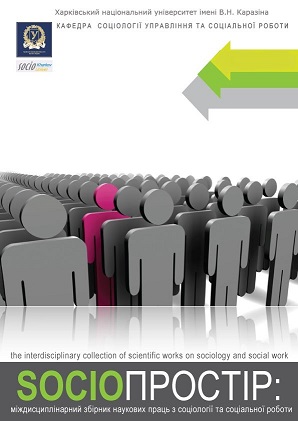Crisis сommunication in social work during the war
Abstract
The article analyzes the concepts of crisis and crisis communication in social work. The author notes the relevance of the need for the scientific development of algorithms and programs of crisis communications in social work during the war. Crisis communication in social work is defined as the establishment of sustainable interaction between local governments, civil society institutions, social institutions, churches, business representatives, and contact audiences (community residents, internally displaced persons, families of fallen soldiers, and other categories of victims of warfare) about existing problems and needs, their prompt resolution by all participants of the interaction. The following key properties of crisis communication in social work are identified by the author: flexibility and adaptability of methods of interaction between subjects; strengthening the informal means of reception and transmission of information; reduction of centralism in the communication process; promptness of the situational response to emerging problems. Crisis communication in social work is a sequence of actions that form a сеrtain communication strategy. The article determines the requirements for the development of a communication strategy during martial law in Ukraine and measures for its implementation, namely: identification of all possible contact audiences expecting information about further actions; reporting only verified and confirmed information; establishment of channels for receiving feedback from the contact audiences, as well as systematicity of two-way interaction of the subjects; assessment of the strengths and weaknesses of the communication activities carried out in order to avoid mistakes in crisis communication in the future. The author emphasizes that the crisis contains both potential threats and the danger of loss, as well as new
renewal and transformation opportunities for society, creating new modern approaches to interaction after a crisis period. Crisis phenomena in society will contribute to the emergence of new or modification of existing social practices, and cause a reaction to them from the public. As a result, new behavioral and communication practices and new subjects of interaction will emerge.
Downloads
References
/References
Garmatiuk, O. & Harmatiuk, А. (2017). Effective communication and information events in a crisis situations. SocioEconomic Problems and the State, 16 (1), 121-128. Retrieved from http://sepd.tntu.edu.ua/images/stories/pdf/2017/17goovks.pdf.
Harkavyi, Y. N. (2019). Crisis communications as the way of implementation of strategic communications in the defense forces of Ukraine. Politichne zhittya, 3, 64-70. Retrieved from http://nbuv.gov.ua/UJRN/pollife_2019_3_12.
Jezhyzhanska, T. S. (2012). Corporative Communication in a Crisis. Masova komunikaciya: istoriya, sogodennya, perspektivi: naukovo-praktichnij zhurnal. Luck: Volinskij nacionalnij universitet im. Lesi Ukrayinki, 1 (1), 5-10. Retrieved from http://evnuir.vnu.edu.ua/handle/123456789/8585.
Mudrak, L. (2020). Communication and crisis. How communities can face challenges and act successfully in times of crisis. Kyiv.
Stavchenko, S. (2017). Crisis Communication and Risk-Communication in the Political Process: Common and Peculiar Features. Evropský politický a právní diskurz, Sv. 4, Vyd. 4, 129-135. Retrieved from http://nbuv.gov.ua/UJRN/evrpol_2017_4_4_20.
Гарматюк О., Гарматюк А. Ефективні комунікації та інформаційні заходи в кризових ситуаціях. Соціально-економічні проблеми і держава. 2017. Вип. 1 (16). С. 121–128.
URL: http://sepd.tntu.edu.ua/images/stories/pdf/2017/17goovks.pdf (дата звернення: 01.11.2022).
Гарькавий Є. М. Кризові комунікації як напрям реалізації стратегічних комунікацій у силах оборони України. Політичне життя. 2019. № 3. С. 64–70. URL: http://nbuv.gov.ua/UJRN/pollife_2019_3_12 (дата звернення 05.11.2022).
Єжижанська Т. С. Корпоративні комунікації в умовах кризи. Масова комунікація: історія, сьогодення, перспективи: науково-практичний журнал / відп. ред. С. І. Кравченко; упоряд. М. А. Рожило. Луцьк : Волинський національний університет ім. Лесі Українки, 2012. № 1 (1). С. 5–10. URL: http://evnuir.vnu.edu.ua/handle/123456789/8585 (дата звернення 10.11.2022).
Мудрак Л. Комунікація і криза. Як громадам протистояти викликам і успішно діяти в період кризи : посіб. Київ : Без видавництва, 2020. 108 с.
Ставченко С. Кризова комунікація і ризик-комунікація у політичному процесі: спільне та особливе. Evropský politický a právní diskurz. 2017. Sv. 4, Vyd. 4. С. 129–135. URL: http://nbuv.gov.ua/UJRN/evrpol_2017_4_4_20 (дата звернення 10.11.2022).

